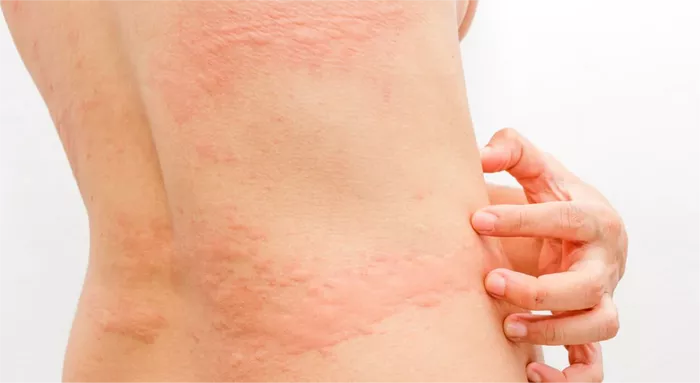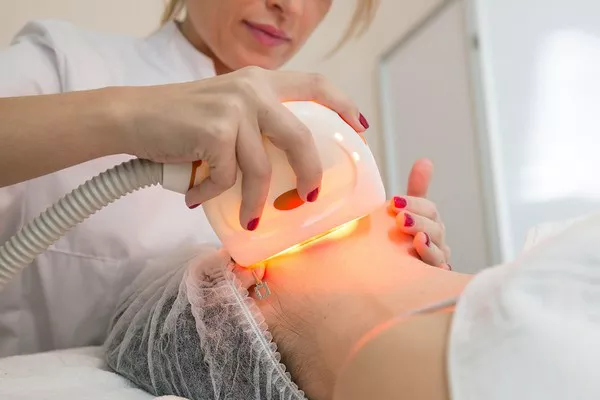Hives, also known as urticaria, are a common skin condition characterized by red, itchy welts that can appear anywhere on the body. These welts may vary in size, shape, and frequency, causing significant discomfort and, in some cases, distress due to their sudden onset and unpredictable nature. Understanding why hives spread across the body is crucial for effective management and treatment.
What Are Hives?
Hives are typically a result of an allergic reaction, where the immune system releases histamines and other chemicals into the bloodstream in response to a perceived threat. These chemicals cause blood vessels to leak, leading to the swelling and redness characteristic of hives. While hives can appear localized, they often spread, affecting larger areas of the skin.
Triggers and Causes
Various factors can trigger the initial appearance of hives, including:
- Allergic Reactions: Foods, medications, insect stings, and pollen are common allergens that can trigger hives.
- Physical Stimuli: Pressure, temperature changes, sunlight, and exercise can provoke hives.
- Infections: Viral infections, such as the common cold, can sometimes cause hives.
- Chronic Conditions: Autoimmune diseases and chronic illnesses can lead to persistent hives.
- Stress: Emotional stress and anxiety can exacerbate hives.
The Mechanisms Behind the Spread of Hives
1. Histamine Release and Immune Response
The primary mechanism behind the spread of hives involves the release of histamines and other inflammatory mediators from mast cells in the skin. When these cells degranulate, they release histamine, which increases the permeability of blood vessels. This increased permeability allows fluids to leak into surrounding tissues, causing the characteristic swelling and redness. The spread of hives can be attributed to several factors:
- Diffuse Activation: In some cases, the immune response is not localized, and mast cells throughout the body are activated, leading to widespread hives.
- Circulatory Dissemination: Histamines and other mediators can circulate in the bloodstream, affecting distant areas and causing new hives to form away from the initial site.
- Neurogenic Factors: Nerve endings in the skin can release neuropeptides in response to stress or other stimuli, further contributing to the spread of hives.
2. Autoimmune Components
In chronic urticaria, an autoimmune component may be involved. The body’s immune system mistakenly targets healthy cells, including mast cells, causing their activation and histamine release. This autoimmune response can lead to persistent and widespread hives, often without an obvious external trigger.
3. Physical and Environmental Factors
Physical factors such as heat, cold, pressure, and sunlight can cause localized hives that may spread. For example, a person might develop hives on their back after carrying a heavy backpack (pressure-induced urticaria), which can then spread to other areas due to the body’s overall inflammatory response. Environmental factors such as allergens in the air or contact with irritants can similarly cause hives to spread across the body.
4. Psychological Influences
Stress and anxiety can play a significant role in the spread of hives. The body’s stress response can lead to the release of cortisol and adrenaline, which can exacerbate the immune response and increase histamine release. Psychological factors can also affect the perception of itching, leading to scratching that further irritates the skin and spreads hives.
SEE ALSO: What Is Urticaria and Angioedema
Types of Hives and Their Patterns
Understanding the different types of hives can provide insight into their spread:
- Acute Urticaria: This type usually lasts less than six weeks and is often triggered by allergens or infections. The spread can be rapid and extensive, particularly if the allergen is ingested or widely disseminated in the body.
- Chronic Urticaria: Lasting more than six weeks, this type may have autoimmune or idiopathic origins. The spread is often more gradual and persistent, with hives appearing in different areas over time.
- Physical Urticaria: Triggered by physical stimuli like pressure, temperature changes, or exercise, these hives often spread in response to ongoing or repeated exposure to the trigger.
- Dermatographic Urticaria: Also known as “skin writing,” this type is triggered by scratching or firm pressure, leading to linear hives that can spread through repeated scratching or pressure.
Diagnosis and Evaluation
Diagnosing the underlying cause of hives is essential for effective treatment. A thorough medical history, physical examination, and sometimes allergy testing or blood tests are necessary to identify triggers and rule out underlying conditions. Key steps in the diagnostic process include:
- Identifying Triggers: Detailed patient history to identify potential allergens, infections, or stress factors.
- Allergy Testing: Skin prick tests or blood tests to identify specific allergens.
- Blood Tests: To check for signs of infection, autoimmune markers, or thyroid function.
- Physical Challenge Tests: For physical urticaria, tests such as applying pressure, heat, or cold to the skin to observe reactions.
Management and Treatment Strategies
1. Avoidance of Triggers
Once triggers are identified, avoiding them is crucial. This might include dietary changes, avoiding certain medications, or managing environmental factors like pollen or pet dander.
2. Medications
Several medications can help manage hives and prevent their spread:
- Antihistamines: The first line of treatment, these medications block histamine receptors and reduce symptoms.
- Corticosteroids: Used for severe cases, these drugs reduce inflammation and suppress the immune response.
- Leukotriene Receptor Antagonists: These can be effective in cases where antihistamines are insufficient.
- Immunosuppressants: In chronic or autoimmune urticaria, medications like cyclosporine can be used.
- Biologics: Omalizumab (Xolair) is an injectable medication that can be effective for chronic idiopathic urticaria.
3. Lifestyle and Home Remedies
In addition to medications, lifestyle changes and home remedies can help manage hives:
- Stress Management: Techniques such as meditation, yoga, and counseling can reduce stress-related hives.
- Cool Compresses: Applying cool compresses to affected areas can reduce itching and swelling.
- Loose Clothing: Wearing loose, comfortable clothing can prevent irritation and spread of hives.
- Hydration: Staying well-hydrated can support overall skin health and recovery.
4. Monitoring and Follow-up
Regular monitoring and follow-up with a healthcare provider are essential, especially for chronic or recurrent hives. This helps in adjusting treatment plans and ensuring that underlying causes are adequately addressed.
When to Seek Medical Attention
While many cases of hives are mild and self-limiting, certain situations require immediate medical attention:
- Severe Allergic Reactions: Symptoms such as difficulty breathing, swelling of the face or throat, or dizziness may indicate anaphylaxis, a medical emergency.
- Chronic or Recurrent Hives: Persistent hives lasting more than six weeks should be evaluated by a healthcare provider.
- Unidentified Triggers: If the cause of hives is unclear, professional evaluation is necessary to identify potential triggers and underlying conditions.
Conclusion
Hives, though often a benign condition, can be distressing due to their sudden appearance and potential to spread. Understanding the mechanisms behind the spread of hives, including histamine release, autoimmune factors, physical triggers, and psychological influences, is essential for effective management. Through a combination of avoiding known triggers, appropriate medical treatment, and lifestyle modifications, individuals can effectively control hives and minimize their impact on daily life. Regular follow-up with healthcare providers ensures that treatment plans are adjusted as needed and that any underlying conditions are properly managed. By taking a comprehensive approach, individuals with hives can achieve better outcomes and improve their quality of life.
Related Topics:



























